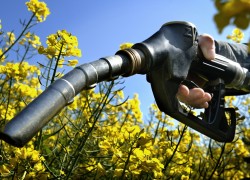
Today, the vast majority of biofuels used in vehicles with petrol engines are made with first generation bioethanol produced using resources such as wheat, maize, sugar beet and sugar cane. However, an EU-funded project is creating second generation biofuel from agricultural residues, avoiding any land use conflict with the food and feed sectors which first generation biofuels can create.
The Germany-based SUNLIQUID project is working on rolling out the technology that turns wheat and barley straw, corn stover – the leaves and stalks of maize, rice straw and the leftovers of sugar cane into ethanol. This process, which extracts and then converts the sugars contained in the plant material almost entirely into ethanol, could make use of around 60% of the 240 million tonnes of residual cereal straw which could be collected from the fields in Europe after harvest every year.
Using the SUNLIQUID process, 27 million tons of cellulosic ethanol could be produced from this volume of straw, which is equivalent to almost 18 million tons of petrol made from fossil fuels, according to the project. This means that around 25% of the EU´s demand for petrol predicted for 2020 could be met by cellulosic ethanol, which would help the EU exceed its target for a 10% share of biofuels in the transport sector by 2020.
The project’s pilot plant has been running in Munich, Germany since 2009. Since 2012, a new large-scale facility in Straubing near Munich, producing up to 1000 tons of bioethanol per year, was constructed and started operation in 2012.
Today, the latest Mercedes-Benz BlueDIRECT cars can run on sunliquid20, a high quality petrol containing 20% bioethanol and produced in Straubing.
The total project costs € 224 500 000, including €23 000 000 in EU funding.








